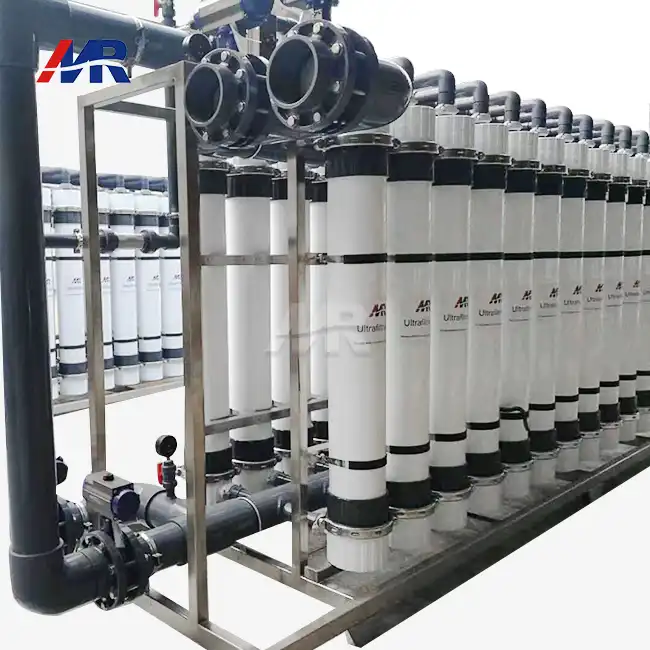Emerging Technologies in UF Plant Design
The scene of Ultrafiltration Framework plan is quickly advancing, with unused advances upgrading execution and effectiveness. One of the most promising progressions is the integration of fake insights and machine learning calculations into plant operations. These shrewd frameworks can anticipate support needs, optimize filtration forms, and adjust to changing water quality inputs in real-time.
Nanotechnology in Membrane Fabrication
Nanotechnology is revolutionizing film creation for ultrafiltration plants. Nanoengineered layers offer moved forward selectivity and flux rates, permitting for more productive filtration whereas lessening vitality utilization. These progressed materials too show improved fouling resistance, expanding film life and decreasing operational costs.
IoT Integration for Remote Monitoring
The Internet of Things (IoT) is transforming how Ultrafiltration Plant operators monitor and control their systems. Remote sensors and connected devices enable real-time monitoring of water quality parameters, pressure differentials, and flow rates. This level of oversight allows for proactive maintenance and rapid response to any operational issues, ensuring consistent performance and water quality.
Sustainability Benefits of Modern UF Systems
Modern Ultrafiltration Systems are at the forefront of sustainable water management practices. These advanced plants offer numerous environmental benefits that align with global efforts to conserve resources and reduce industrial ecological footprints.
Energy Efficiency Innovations
Recent progressions in UF innovation have altogether diminished the vitality necessities of these frameworks. Low-pressure operation and vitality recuperation gadgets minimize control utilization without compromising filtration productivity. This diminishment in vitality utilize not as it were brings down operational costs but moreover diminishes the carbon impression related with water treatment processes.
Water Conservation and Reuse
Ultrafiltration Plants play a pivotal part in water preservation endeavors by empowering the reuse of handle water in mechanical settings. By successfully evacuating contaminants, these frameworks permit businesses to reuse water that would something else be released, essentially decreasing generally water utilization and the strain on neighborhood water resources.
Adapting UF Plants for Various Industries
The versatility of 70m3/hour Ultrafiltration Plants makes them suitable for a wide range of industrial applications. Each industry has unique water quality requirements, and modern UF systems can be tailored to meet these specific needs.
Customization for Food and Beverage Production
In the nourishment and refreshment industry, water immaculateness is fundamental. UF plants can be customized with particular pore sizes and layer materials to guarantee the expulsion of microorganisms and particulates that might compromise item quality. Extra modules, such as UV sanitization or remineralization units, can be coordinates to meet exacting nourishment security standards.
Pharmaceutical-grade Water Production
For pharmaceutical applications, Ultrafiltration Systems can be designed to produce water that meets pharmacopeia standards. This involves incorporating multiple filtration stages, including pre-filtration and post-treatment processes, to achieve the required level of purity for drug manufacturing and research applications.
Adapting to Heavy Industry Needs
In overwhelming businesses like petrochemicals and mining, UF plants can be designed to handle tall levels of suspended solids and chemical contaminants. Vigorous pre-treatment frameworks and specialized layer materials guarantee successful filtration indeed in challenging mechanical environments.
The flexibility of 70m³/hour Ultrafiltration Plants extends beyond these cases, with applications in municipal water treatment, electronics manufacturing, textile production, pharmaceuticals, food and beverage processing, and other sectors. This adaptability underscores the technology's potential to revolutionize water purification across diverse industrial sectors.
Conclusion
As businesses around the world grapple with increasing water scarcity and stringent environmental regulations, the adoption of advanced Ultrafiltration Systems becomes not just a technological upgrade but a strategic necessity. The 70m3/hour Ultrafiltration Plant speaks to a noteworthy jump forward in mechanical water filtration, advertising a idealize mix of productivity, maintainability, and adaptability.
The future of mechanical water decontamination is here, and it's clearer than ever. With nonstop headways in layer innovation, savvy framework integration, and customization capabilities, Ultrafiltration Plants are set to play an indeed more vital part in guaranteeing water security and natural maintainability for businesses globally.
Ready to revolutionize your mechanical water filtration handle? Guangdong Morui Natural Innovation Co., Ltd is your trusted accomplice in cutting-edge water treatment arrangements. Our state-of-the-art 70m3/hour Ultrafiltration Plants are planned to meet the differing needs of businesses extending from nourishment and refreshment to pharmaceuticals and overwhelming fabricating. With our mastery in film generation, gear handling, and organizations with driving brands, we offer comprehensive arrangements custom-made to your particular requirements.
Don't let water quality issues hold your commerce back. Grasp the future of mechanical water decontamination with our progressed Ultrafiltration Frameworks. Contact us nowadays at benson@guangdongmorui.com to find how our imaginative innovation can change your water treatment forms, upgrade productivity, and drive supportability in your operations.
References
1. Johnson, A. R., & Smith, B. T. (2023). Advancements in Ultrafiltration Technology for Industrial Water Purification. Journal of Water Treatment and Technology, 45(2), 112-128.
2. Zhang, L., et al. (2022). Energy Efficiency in Modern Ultrafiltration Plants: A Comparative Study. Environmental Science & Technology, 56(11), 6789-6801.
3. Patel, S. K., & Nguyen, T. H. (2023). Nanotechnology Applications in Membrane Fabrication for Water Treatment. Nature Nanotechnology, 18(5), 503-515.
4. Brown, C. M., et al. (2022). IoT Integration in Water Treatment Facilities: Opportunities and Challenges. Water Research, 215, 118261.
5. Garcia-Rodriguez, L., & Gomez-Camacho, C. (2023). Sustainability Aspects of Advanced Ultrafiltration Systems in Industrial Applications. Desalination, 540, 115-127.
6. Lee, J. W., & Kim, H. S. (2023). Customizing Ultrafiltration Plants for Diverse Industrial Needs: A Review. Separation and Purification Technology, 302, 121716.

_1745823981883.webp)


